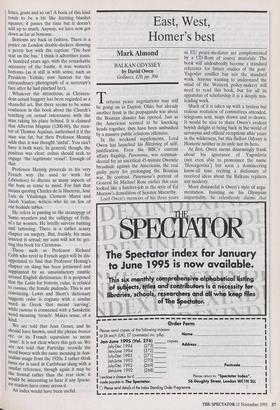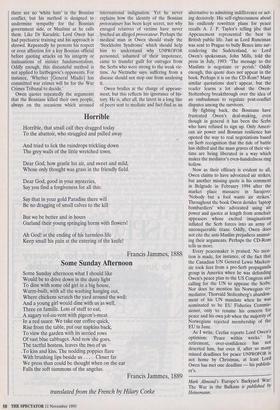East, West, Homer's best
Mark Almond
BALKAN ODYSSEY by David Owen Gollancz, £20, pp. 394 Tortuous peace negotiations may still be going on in Dayton, Ohio, but already another front in the propaganda war about the Bosnian disaster has opened. Just as the Americans seemed to be knocking heads together, they have been ambushed by a massive public relations offensive. In the weekend supplements, Lord Owen has launched his Blitzkrieg of self- justification. Even the BBC's current affairs flagship, Panorama, was comman- deered for an uncritical 45-minute Owenite broadside against the Americans, the real guilty party for prolonging the Bosnian war. By contrast, Panorama's portrait of General Sir Michael Rose earlier this year looked like a hatchet-job in the style of Ed Murrow's demolition of Senator Macarthy.
Lord Owen's memoirs of his three years
as EU peace-mediator are complemented by a CD-Rom of source materials. The book will undoubtedly become a standard reference for future studies of the post- Yugoslav conflict but not the standard work. Anyone wanting to understand the mind of the Western policy-makers will need to read this book, but for all its apparatus of scholarship it is a deeply mis- leading work.
Much of it is taken up with a tireless but tedious recitation of committees attended, telegrams sent, maps drawn and re-drawn. It would be nice to share Owen's evident boyish delight at being back in the world of acronyms and official receptions after years in the wilderness, but this Balkan Odyssey is Homeric neither in its style nor its hero.
At first, Owen seems disarmingly frank about his ignorance of Yugoslavia (not even able to pronounce the name `Hercegovina') but soon a domineering know-all tone reciting a dictionary of received ideas about the Balkans replaces any modesty.
More distasteful is Owen's style of argu- mentation. Insisting on his Olympian impartiality, he relentlessly claims that there are no 'white hats' in the Bosnian conflict, but his method is designed to undermine sympathy for the Bosnian government side, or Muslims as he calls them. Like Dr Karadzic, Lord Owen has had psychiatric training and his approach is shrewd. Repeatedly he protests his respect or even affection for a key Bosnian official before quoting attacks on his integrity or insinuations of sinister fundamentalism. Oddly enough, this distasteful method is not applied to Izetbegovic's opponents. For instance, 'Whether [General Mladic] has committed war crimes will be for the War Crimes Tribunal to decide.'
Owen quotes repeatedly the arguments that the Bosnians killed their own people, always on the occasions which aroused international indignation. Yet he never explains how the identity of the Bosnian provocateurs has been kept secret, nor why enraged relatives of victims have never lynched an alleged provocateur. Perhaps the medical man in Owen should study the `Stockholm Syndrome' which should help him to understand why UNPROFOR personnel, ashamed of their impotence, came to transfer guilt for outrages from the Serbs who were strong to the weak vic- tims. As Nietzsche says, suffering from a disease should not stop one from analysing it.
Owen bridles at the charge of appease- ment, but this reflects his ignorance of his- tory. He is, after all, the latest in a long line of peers sent to mediate and fact-find as an alternative to admitting indifference or act- ing decisively. His self-righteousness about his endlessly rewritten plans for peace recalls A. J. P. Taylor's telling jibe that Appeasement represented the best in British public life. Just as Lord Runciman was sent to Prague to bully Benes into sur- rendering the Sudetenland, so Lord Owen's spokesman, John Mills, told the press in July, 1993: 'The message to the Muslims is negotiate or perish.' Oddly enough, this quote does not appear in the book. Perhaps it is on the CD-Rom? Many similar quotations don't appear, but the reader learns a lot about the Owen- Stoltenberg breakthrough over the idea of an ombudsman to regulate post-conflict disputes among the survivors.
By fighting back, the Bosnians have frustrated Owen's deal-making, even though in general it has been the Serbs who have refused to sign up. Only Ameri- can air power and Bosnian resilience has opened the way to real negotiations based on Serb recognition that the tide of battle has shifted and the mass graves of their vic- tims are being liberated in a way which makes the mediator's even-handedness ring hollow.
Now as their efficacy is evident to all, Owen claims to have advocated air strikes, but another missing quote is his comment in Belgrade in February 1994 after the market place massacre in Sarajevo: `Nobody but a fool wants air strikes.' Throughout the book Owen derides 'laptop bombardiers' who advocated using air power and quotes at length from armchair appeasers whose excited imaginations inflated the Serb forces into an army of unconquerable titans. Oddly, Owen does not cite the anti-Muslim prejudices animat- ing their arguments. Perhaps the CD-Rom tells us more.
Every peacemaker is praised. No men- tion is made, for instance, of the fact that the Canadian UN General Lewis Macken- zie took fees from a pro-Serb propaganda group in America when he was defending Owen's peace plan to the US Congress and calling for the UN to appease the Serbs. Nor does he mention his Norwegian co- mediator, Thorvald Stoltenberg's abandon- ment of his UN mandate when he was nominated to be EU Fisheries Commis- sioner, only to resume his concern for peace and his own job when the majority of Norwegians rejected membership of the EU in June.
As I write, Ceefax reports Lord Owen's optimism: 'Peace within weeks.' In retirement, over-confidence has not deserted him, but even if, after so many missed deadlines for peace UNPROFOR is not home by Christmas, at least Lord Owen has met one deadline — his publish- er's.
Francis Jammes, 1889
Mark Almond's Europe's Backyard War: The War in the Balkans is published by Heinemann.



















































































 Previous page
Previous page